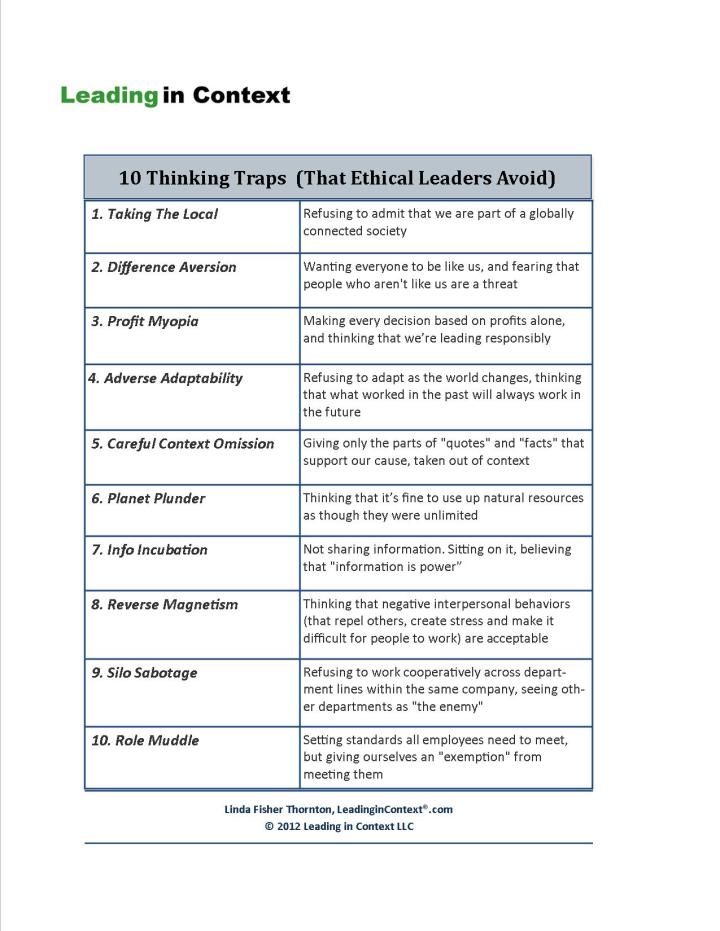Avoid These 10 Thinking Traps
What are some of the thinking traps that we fall into as leaders? I’m not referring to “correlation versus causation” and other logical reasoning problems. There are some common ways of thinking about business leadership that cripple our effectiveness and undermine our ethics. These misconceptions should have important names that reflect the wide swath of negative impact that they cause in organizations.
Here are 10 types of flawed leadership thinking that I have seen, with my own tongue-in-cheek descriptive names for them…

The message? Ethical leaders avoid these 10 types of flawed thinking.
Which one of these is your favorite? My favorite is #10.

For more, see Linda’s book 7 Lenses and the 21 Question Assessment: How Current is My Message About Ethics?
 2014 Axiom Business Book Award Winner
About 7 Lenses
Info@LeadinginContext.com @leadingincontxt @7Lenses
2014 Axiom Business Book Award Winner
About 7 Lenses
Info@LeadinginContext.com @leadingincontxt @7Lenses
© 2012 Leading in Context LLC
Reblogged this on Matthews' Blog.
LikeLike
You present some excellent points. One parallel of number 7 that I have experienced is Canned Capability, with leaders or managers refusing to unleash known employee or group capability that could make the vital difference in degree and scope of result out of fear of one-upmanship, senior rejection or disdain for a particular employee or group.
LikeLike
Found all of these in my current company.
LikeLike
Another. Accepting that others are of lesser value and disposable:
“This is a tricky question. Except in the case of self-defense, if for any reason we answer “Yes”, regardless of what that reason is, we are in effect agreeing with the proposition of disposing of human beings. Whether disposal be from deprivation or execution, the result is the same for the victim. If we agree that sometimes, for some reasons, it is acceptable and permissible to dispose of human beings, actively or passively, the next question is “Which people?” Of course I will never argue that one of them should be me, though perhaps it should be you. You respond in kind, it cannot be you, but maybe it should be me. Not only can it not be you, it also cannot be your spouse, your children, your mother or father, your friends, your neighbors, but, maybe someone else. Naturally I feel the same way. Maybe we come to an agreement that it shouldn’t be either you or me, or our families and friends, that can be disposed of, but perhaps someone else. While we are debating this — passionately and sincerely, no doubt — a third party comes along and without warning disposes of the both of us, or our families, or our friends. And there is the trap we have fallen into, because whether or not we approve of our or our families’ and friends’ demise is irrelevant. It is fair because we accepted the principle of human disposability. We just didn’t intend that it be us who are tossed, but if we or our families and friends die, it is in accordance with principles that we ourselves have accepted and so must live — and die — by. “
http://economics4humanity.wordpress.com/2012/05/26/you-me-we-ethics-and-people-centered-economics/
LikeLike
Thanks for sharing your “most challenging” one Tom. We are definitely social creatures and it is easy to gravitate toward people who are like us. If we were honest, we would probably all have to admit that we struggle with #2 at times.
LikeLike
I’ve been guilty of most of these, but #2 is the hardest for me. I really try to be sensitive to differences in people, but understanding them can be difficult. Without understanding, fear can be a deeply rooted motivator
LikeLike